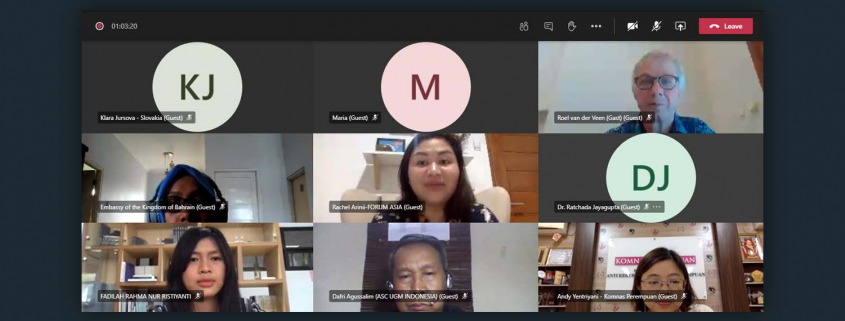Press Release – “Diplomatic Briefing on the ACWC 10th Year Commemoration – Solidifying the Role of Think Tanks and CSOs in the Advocacy to Strengthen the ASEAN Commission of Women and Children (ACWC)”
In continuation of the commemoration of the 10th anniversary of the ASEAN Commission on the Promotion and Protection of the Rights of Women and Children (ACWC), the ASEAN Studies Center UGM conducted a Diplomatic Briefing discussing the Commission’s work in the past decade and future outlook of its work. This event was held virtually on Friday, 9 October 2020, also with the support of the Embassy of the Kingdom of the Netherlands and FORUM-ASIA.
Carrying the same theme, namely “Solidifying the Role of Think Tanks and CSO in the Advocacy to Strengthen the ASEAN Commission of Women and Children (ACWC)”, the forum invited the insights, experiences and thoughts from the audience on ways to further the cause of promoting the rights and protection of women and children in the region.
The meeting commenced with opening remarks delivered by Dr. Dafri Agussalim, Executive Director of ASEAN Studies Center UGM, followed by speech by Prof. Roel van der Veen, Head of Political Affairs of the Embassy of the Kingdom of the Netherlands, and also Shamini Darshni Kaliemuthu, Executive Director of FORUM-ASIA to launch the Report of FORUM-ASIA titled Assessing the Commission’s Impact on Protecting Women and Children’s Rights in ASEAN. Dr. Dafri emphasized the importance of promoting, ensuring the rights of women and children as they are an integral part of a thriving community. The success of ASEAN in empowering and protecting the rights of women and children will likely lead us to become a successful region in the future. In line with this, Prof. van der Veen also stated the commitment of the Netherlands to always support ASEAN in reinforcing its regionalism, where it can be achieved by having strong regional institution that can ensure and protect the rights of its citizens, including women and children.
The discussion session of the Diplomatic Briefing was moderated by Andy Yentriyani Commissioner of the Committee for the National Commission on Violence Against Women (Komnas Perempuan). To start the discussion, Rachel Arinii Judhiastri, FORUM-ASIA, highlighted several key findings on FORUM-ASIA Report on the ACWC+10 including the fact that only 25% of the 2016-2020 Workplan had been implemented. This was due to several challenges in the region such as the Rohingya crisis, other human rights abuse towards marginalized groups, and lack of engagement in CEDAW and CRC reporting which clearly affected the responsiveness of ACWC in addressing issues relating to human rights of women and children. However, ACWC had also achieved notable milestones such as the Declaration on the Protection of Children from all Forms of Online Exploitation and Abuse in ASEAN, the campaign on Trafficking in Persons and also the nexus to Violation Against Women. Therefore, as she also emphasized, there is a need to have strong regional mechanism which can accelerate the efforts in achieving gender equality, particularly within the Southeast Asia region.
Agustina Kustulasari, Senior Fellow, ASEAN Studies Center UGM, highlighted how ASEAN principles have hindered the decision making process and implementation of regulations and conventions related to the human rights issues, such as the rights of women and children. Therefore, to address this situation carefully, several recommendations included to involve more policy actors and media as the fourth pillar of democracy which can bring public opinions into the agenda setting and accelerate policymaking processes in the region. Engagement with the media in campaigning sensitive journalism will help amplify the use of appropriate terms when advocating issues to the government. She also mentioned the importance of involving the academia in conducting research related to the concerns of ACWC . This will help nudge ASEAN governments to place the issue of women and children, higher in the regional agenda.
H.E. Dr. Ratchada Jayagupta, ACWC Thailand, as respondent, focused her presentation on the implementation of ACWC TOR in Thailand. The ACWC Thailand had endorsed the ACWC gender sensitive guidelines on handling women victim of human trafficking in 2016, and translated the guidelines into Thai. A pilot project for capacity building was also conducted where it involved officials and CSOs working together on advocating particularly on anti-human trafficking. ACWC Thailand also attempted to increase the visibility of ACWC through various social media and channels to provide information and regular activities of the commission, as well as making the channels as a direct communication platform with all ACWC Representatives. The dialogue was then followed with a Q&A session where it discussed the hindrances of substantive engagement between ACWC and other ASEAN bodies, CSOs, think tanks, and also donors within the region. In general, during the ten years of the ACWC journey in advocating rights for women and children, the engagement with ASEAN mechanisms and other CSOs in the region had faces various challenges including limited resources, staffing in implementing its activities and overall support from ASEAN member countries. The limited visibility of the information about ACWC also may be one of the factors that affected the quality of the substantive engagement with the bodies, compared to other ASEAN human rights mechanisms.




Leave a Reply
Want to join the discussion?Feel free to contribute!